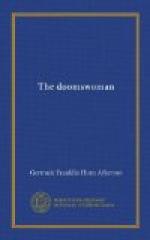On the side of the hill by the road was a solitary hut. He was obliged to pass it. A candle burned beyond the open window, and he set his lips and turned his head; not from fear of contagion, however. And his eyes were drawn to the window in spite of his resolute will. He looked once, and looked again, then checked his horse. On the bed lay a girl in the middle stages of the disease, her eyes glittering with delirium, her black hair matted and wet. She was evidently alone. Estenega spurred his horse and galloped around to the back of the hut. In the kitchen, the only other room, huddled an old crone, brown and gnarled like an old apple. She was sleeping; by her side was a bottle of aguardiente. Estenega called loudly to her.
“Susana!”
The creature stirred, but did not open her eyes. He called twice again, and awakened her. She stared through the open door, her lower jaw falling, showing the yellow stumps.
“Who is?”
“Is Anita alone with you?”
“Ay, yi! Don Diego! Yes, yes. All run from the house like rats from a ship that burns. Ay, yi! Ay, yi! and she so pretty before! A-y, y-i!—” Her head fell forward; she relapsed into stupor.
Estenega rode around to the window again. The girl was sitting on the edge of the bed, mechanically pulling the long matted strands of her hair.
“Water! water!” she cried, faintly. “Ay, Mary!” She strove to rise, but fell back, clutching at the bedclothing.
Estenega rode to a deserted hut near by, concealed his saddle in a corner under a heap of rubbish, and turned his horse loose. He returned to the hut where the sick girl lay, and entered the room. She recognized him in spite of her fever.
“Don Diego! Is it you?—you?” she said, half raising herself. “Ay, Mary! is it the delirium?”
“It is I,” he said. “I will take care of you. Do you want water?”
“Ay, water. Ay, thou wert always kind, even though thy love did last so little a while.”
He brought the water and did what he could to relieve her sufferings: like all the rancheros, he had some knowledge of medicine. He held the old crone under the pump, gave her an emetic, broke her bottle, and ordered her to help him care for the girl. Between awe of him and promise of gold, she gave him some assistance.
Estenega watched the vessel sail the next morning, and battled with the impulse to leap from the window, hire a boat, and overtake it. The delay of a month might mean the death of his hopes. For all he knew, the bark carried the letters of his undoing; Reinaldo himself might be on it. He set his lips with an expression of bitter contempt—the expression directed at his own impotence in the hands of Circumstance,—and went to the bedside of the girl. She was hopelessly ill; even medical skill, were there such a thing in the country, could not save her; but he could not leave to die like a




